Select Language

By Indranil Sarkar and Arpan Chaturvedi
BENGALURU/NEW DELHI (Reuters) -Edtech company Byju's, once India's biggest startup valued at $22 billion, will face insolvency proceedings for failure to pay $19 million in dues to the country's cricket board, a tribunal said on Tuesday.
Byju's has suffered numerous setbacks in recent years, including boardroom exits and a tussle with investors who accused CEO Byju Raveendran of corporate governance lapses, job cuts and a collapse in its valuation to less than $3 billion. Byju's has denied any wrongdoing.
A ruling by India's companies tribunal on Tuesday, following a complaint by the Board of Control for Cricket in India (BCCI), initiated insolvency proceedings.
These will include the appointment of an interim resolution professional, Pankaj Srivastava, who will oversee the management of Byju's as the company's board of directors is suspended as per law.
CEO Raveendran will report to the resolution professional and the company's assets will remain frozen while the proceedings continue.
In a statement, Byju's said it wishes to "reach an amicable settlement with BCCI and we are confident that, despite this order, a settlement can be reached."
The company's lawyers are reviewing the order and will take necessary steps to protect the firm's interests, it added.
Byju's, which operates in more than 21 countries, became popular during COVID-19 pandemic by offering online education courses. It also offers offline coaching classes.
In February, a group of Byju's investors including Prosus (OTC:PROSF) and Peak XV voted to oust Raveendran, a move which Byju's has called invalid.
The companies tribunal said in its order "it cannot be disputed" that the parent of Byju's, Think & Learn Private Limited, had availed itself of the services of the BCCI and had defaulted on roughly $19 million in dues.
Delhi-based lawyer Bishwajit Dubey said Byju's controlling shareholders can either appeal the insolvency initiation legally or quickly settle the dispute with the cricket board to resolve the matter.
The BCCI declined a Reuters request for comment.

By Tom Westbrook
SINGAPORE (Reuters) - Gold hit a record and bonds rallied on Wednesday as markets prepared for global interest rates to fall, while stocks in Taiwan slipped after U.S. presidential candidate Donald Trump sounded lukewarm in his commitment to the island's defence.
The S&P 500 scaled record highs overnight and futures were steady in Asia. MSCI's broadest index of Asia-Pacific shares outside Japan was flat and Japan's Nikkei rose 0.1%.
In Taiwan, chipmaker TSMC fell 2%, wiping out almost $16 billion in market value, after Trump questioned U.S. support in an interview with Bloomberg Businessweek, saying Taiwan should pay for U.S. protection.
It was unclear exactly what Trump was planning, however his selection of trade hawk J.D. Vance as his running mate had already put markets on notice that China will figure heavily in his foreign policy thinking.
Chinese stocks were subdued for a second day running.
The Taiwan dollar slipped slightly to a two-week low. China's yuan steadied at 7.2676 per dollar.
"It is more and more clear to me that Trump should be bullish USD for at least a while," said Brent Donnelly, president at analytics firm Spectra Markets, as he's expected to impose tariffs and run a higher budget deficit.
"It's hard to imagine USDCNH ending 2024 below 7.25 on a Trump victory in November but it's not hard to imagine it closing above 7.50," he said, referring to the dollar-yuan pair.
Elsewhere in Asia, New Zealand shares hit their highest since March 2022 after data showed inflation slowing, though the rates market dipped and the currency rose on sticky domestically driven inflation.[.AX][NZD/]
Treasuries held gains that had pushed 10-year U.S. yields to four-month lows overnight after Federal Reserve Chair Jerome Powell said recent cooling in inflation readings "add somewhat to confidence" that consumer prices are coming under control.
Fed funds futures have fully priced a U.S. rate cut for September, followed by two more before the end of January 2025.
Ten-year yields were steady at 4.175% and two-year yields hovered at 4.445%. Bond markets in Australia, Japan and South Korea rallied. [JP/][.KS]
Lower yields helped propel gold sharply higher overnight and through chart resistance around $2,450 per ounce despite a broadly firm dollar. It touched a record $2,478 in Asia trade on Wednesday. [GOL/]
"Gold's ability to find support in any condition this year is worth highlighting," said Commonwealth Bank of Australia (OTC:CMWAY) commodity strategist Vivek Dhar.
"While we think gold prices face uncertainty in coming months, we think the uncertainty has a positive skew, raising the risk that gold rises above our forecast of $2,500/oz by the end of the year."
The Japanese yen was slightly weaker at 158.51 per dollar, though after a few rounds of suspected yen buying from Japanese authorities last week it remained well off a 38-year low of 161.96 touched earlier in July.
The euro was steady at $1.0925. Oil prices slipped slightly, weighed by signs of weakening demand from China.
Brent crude futures fell 13 cents to $83.60 a barrel and U.S. crude futures were also 13 cents lower at $80.63 a barrel. [O/R]
British inflation data is due later in the day where focus will fall on services inflation, which is expected to run at a still-hot 5.6% in June from a year earlier.

By David Shepardson and Karen Freifeld
(Reuters) - The U.S. Commerce Department plans to issue proposed rules on connected vehicles next month and expects to impose limits on some software made in China and other countries deemed adversaries, a senior official said Tuesday.
"We're looking at a few components and some software - not the whole car - but it would be some of the key driver components of the vehicle that manage the software and manage the data around that car that would have to be made in an allied country," said export controls chief Alan Estevez at a forum in Colorado.
In May, Commerce Secretary Gina Raimondo said her department planned to issue proposed rules on Chinese-connected vehicles this autumn and had said the Biden administration could take "extreme action" and ban Chinese-connected vehicles or impose restrictions on them after the Biden administration in February launched a probe into whether Chinese vehicle imports posed national security risks.
The comments of Estevez, who is the Commerce under secretary for industry and security, are the most definitive to date about the administration's plans on Chinese vehicles that sparked wide alarm.
Connected cars have onboard integrated network hardware that allows internet access, allowing them to share data with devices both inside and outside the vehicle.
Estevez said Tuesday the threat is serious.
"A car is a very scary thing. Your car knows a lot about you. Your car probably gets a software update, whether it's an electric vehicle or an autonomous combustion engine vehicle," he said.
"A modern car has a lot of software in it. It's taking lots of pictures. It has a drive system. It's connected to your phone. It knows who you call. It knows where you go. It knows a lot about you."
The Chinese foreign ministry has previously urged the United States "to respect the laws of the market economy and principles of fair competition." It argues Chinese cars are popular globally because they had emerged out of fierce market competition and are technologically innovative.
Raimondo said in May "you can imagine the most catastrophic outcome theoretically if you had a couple million cars on the road and the software were disabled."
There are relatively few imports of Chinese-made light duty vehicles in the United States. The Biden administration has proposed sharp hikes in tariffs on Chinese electric vehicles and other goods that they expect to be in place by Aug. 1.
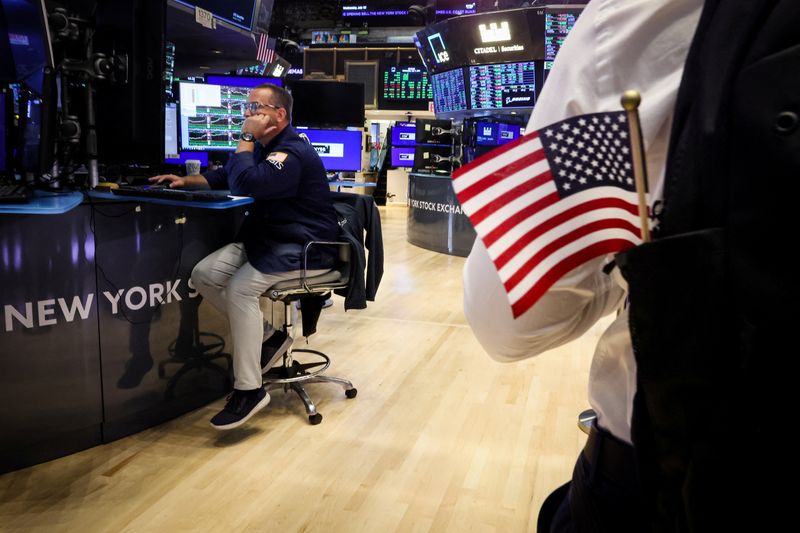
By Stephen Culp
NEW YORK (Reuters) -Wall Street stocks rose and the Dow Jones Industrial Average hit an all-time closing high on Tuesday after U.S. retail sales data supported the view that the Federal Reserve is approaching its easing cycle, reining in inflation while avoiding a recession.
All three major U.S. stock indexes advanced on the day, but weaker megacap growth stocks, led by Nvidia Corp (NASDAQ:NVDA) and Microsoft Corp (NASDAQ:MSFT), capped the tech-heavy Nasdaq's gains.
Economically sensitive small caps extended their rally. The Russell 2000 scored a fifth straight day of gains greater than 1%, its longest winning streak since April 2000. The index gained 3.5%, touching its highest level since January 2022.
Dow transportation stocks also outperformed the broader indexes, logging its biggest one-day percentage gain since November and reaching its highest closing level since August 2023 as investors increasingly focused on undervalued areas of the market.
Value stocks, which have underperformed their growth peers and the broader S&P 500 so far this year, jumped 1.5%.
"This rotation underscores the likelihood of interest rate cuts as early as September," said Greg Bassuk, CEO at AXS Investments in New York. "Small cap companies are among the best-positioned to benefit from rate cuts, and today we're seeing this trifecta of strong earnings, a resilient economy and high confidence of a rate cut in September."
Economic data on Tuesday included stronger-than-expected retail sales reported by the Commerce Department. This provided reassurance that consumer spending, which accounts for about 70% of the U.S. economy, has stayed resilient despite restrictive monetary policy, and eased fears that high interest rates could tip the economy into recession.
"As you look at the economic data, it's slowing down but not at a concerning pace," said Tom Hainlin, national investment strategist at U.S. Bank Wealth Management in Minneapolis. "The Fed is seeing what it wants to see - it's that sweet spot of the economy slowing down but not too much and not too fast."
"This small cap rally seems predicated on the Fed cutting rates at the September meeting, where the futures markets are setting up a 100% probability," Hainlin added.
Second-quarter earnings season is ramping up.
UnitedHealth Group (NYSE:UNH) jumped 6.5% after reporting consensus-topping profit, lifting the blue-chip Dow and the S&P 500 Health Care index to all-time highs.
Bank of America's second-quarter profit beat expectations, and underwriting fees rose as capital markets resurged. The second-largest U.S. bank also provided upbeat net interest income guidance, sending its shares up 5.3%.
Morgan Stanley rose 0.9% even after the investment bank posted disappointing wealth management revenue.
Charles Schwab (NYSE:SCHW) slid 10.2% after reporting a dip in interest income.
Tinder parent Match jumped 7.5% on news that activist investor Starboard has a stake of over 6.5% in the company.
The Dow Jones Industrial Average rose 742.76 points, or 1.85%, to 40,954.48, the S&P 500 gained 35.98 points, or 0.64%, at 5,667.2 and the Nasdaq Composite added 36.77 points, or 0.2%, at 18,509.34.
Of the 11 major sectors in the S&P 500, industrials enjoyed the largest percentage gains, while technology and communication services were the only two sectors to end in negative territory.

By Laura Matthews, Carolina Mandl and Rae Wee
NEW YORK/SINGAPORE (Reuters) - For global investors with money in China's stock markets, the latest economic numbers are not of any comfort and just a reminder that the recovery they are betting on will take a while to happen.
Monday's second-quarter growth figures in China pointed not only to an economy growing below target, but also showed there is no sign of improvement in its anaemic property sector and the domestic consumer is more pessimistic and unwilling to spend.
That backdrop is a signal to investors it will be a long wait before the world's second-largest economy is able to have any meaningful recovery that lifts its stock market, which is up just over 1% this year.
"Being a China investor right now is frustrating," said Phillip Wool, U.S.-based senior managing director at asset manager Rayliant Global Advisors.
Rayliant has been selective but buying some Chinese stocks, which Wool likens to value investing, or a strategy of picking cheap stocks with high earnings potential. Wool says prices should eventually correct higher, but he has no idea when.
After surging some 19% from a multi-year low in February to its highs in May, China's benchmark CSI300 Index has been middling around the 3,400-3,500 range for the past month.
The Shanghai Composite Index has also fallen more than 6% from its eight-month high hit in May.
A slew of support measures from Beijing earlier this year to prop up its ailing stock market, which saw a change of leadership at the market regulator, had spurred investor hopes that the tide could be turning and sparked a short-lived rally.
But a few months on, the country's shaky economic recovery and lingering property crisis continue to remain an overhang, with geopolitical challenges spanning rising trade frictions with the European Union and protracted Sino-U.S. tensions adding to headwinds.
"The problem with China is this is a multi-year healing process," said Michael Dyer, investment director of multi-asset at M&G Investments.
While the authorities and central bank seem to be taking steps in the right direction, "they haven't come along with the bazooka that the rest of the world wants. There's still the geopolitical uncertainty," Dyer said. "So until then, if you're waiting for certainty, you're not going to get it."
BARGAIN-HUNTING
To be sure, some investors have piled in, citing attractive valuations and strong fundamentals, especially for companies that fall under the country's new growth sectors such as advanced technology and manufacturing.
Chinese stocks are cheap. The S&P 500 index trades at a price-to-earnings (PE) ratio of 23, Japan's Nikkei trades at 22, India at 23 and the Shanghai benchmark index is at half that number.
The forward 12-month price-to-book value for Chinese equities also stands at 0.95, compared with a value of 1.26 for the broader Asia-Pacific region.
"As value investors, we cannot ignore the opportunities in Chinese equities but we have to temper our enthusiasm given macro and policy risks that China is facing," said Kamil Dimmich, partner and portfolio manager at North of South Capital EM fund.
He is slightly underweight in the Chinese market overall, but "much less so" than a few years ago when valuations were high.
Foreign flows through the Northbound Connect scheme into Chinese stocks point to 37.6 billion yuan ($5.18 billion) worth of inflows to date. Inflows were 43.7 billion yuan in 2023.
Overall, the consensus seems to be that while peak pessimism towards China has passed, most investors are still waiting on the sidelines for a more definite recovery to play out. And the patience of those already committed is being tested.
"It's painful and stressful being a contrarian and taking in all the negative sentiment and seeing the false starts at a recovery," said Rayliant's Wool. "For better or worse, as a long-term active investor in China, I'm used to this."
($1 = 7.2651 Chinese yuan renminbi)

By Yoruk Bahceli and Dhara Ranasinghe
LONDON (Reuters) - Huge debt piles among the world's biggest economies are starting to unnerve financial markets again, as elections cloud the fiscal outlook.
French bonds took a beating after a surprise election and hefty spending plans caused alarm. U.S. debt dynamics are in focus ahead of a November presidential election.
A debt crisis is not the base case, but investors are alert to the risk of looser purse strings sparking market stress.
"Deficits are back in focus," said Guy Miller, chief market strategist at Zurich Insurance Group (OTC:ZFSVF).
"There needs to be more attention placed on not just the debt, but how to generate a growth dynamic – particularly in Europe," he added.
Here's a look at five big developed economies on the worry list:
1/ FRANCE
A surprise election was a rude awakening to investors who had previously looked past France's creaking public finances. With a budget gap at 5.5% of output last year, France faces European Union disciplinary measures.
France's bond risk premium over Germany briefly surged last month to the highest since 2012's debt crisis as the far right pushed ahead in the election race.
A leftist alliance ultimately won and a hung parliament may limit its spending plans but could also hamper any action to strengthen France's finances.
France's national audit office chief said on Monday there was no room for manoeuvre on the budget and debt must be reduced.
Even before a new government, the EU expected debt at around 139% of output by 2034, from 111% currently. France's risk premium has eased, but remains relatively high.
"There's going to be a permanent fiscal premium embedded in the price," said David Arnaud, fund manager at Canada Life Asset Management.
2/ UNITED STATES
The U.S is not far behind. The Congressional Budget Office reckons public debt will rise from 97% to 122% of output by 2034 - more than twice the average since 1994.
Growing expectations that Donald Trump will win November's presidential election have lifted Treasury yields recently as investors have priced in the risk of larger budget deficits and higher inflation. Some investors reckon the worst outcome for bond markets would be a Trump presidency with a Republican-led House of Representatives and Senate.
That would mean "we can get another round of fiscal stimulus... from a starting point in which the deficit is 6% of GDP," said Legal & General Asset Management's head of macro strategy Chris Jeffery.
While U.S. Treasuries are buffered by their safe-haven status, the yield curve is near its widestsince January, reflecting the pressure facing longer-term borrowing costs.
3/ ITALY
Investors have praised nationalist Prime Minister Giorgia Meloni as market friendly. Yet last year's 7.4% budget deficit was the highest in the EU. So Italy also faces EU disciplinary measures that will test market optimism.
Italian bonds have outperformed their peers. But the risk premium on Italy's bonds briefly hit a four-month high in June, as French bonds sold off, reflecting how quickly jitters can spread.
Rome aims to lower the deficit to 4.3% this year, but has a dismal track record recently for meeting fiscal goals.
Home renovation incentives costing over 200 billion euros since 2020 will put upward pressure on Italian debt for years. The EU executive projects debt rising to 168% of output by 2034 from 137% now.
"You're not getting rewarded for the risk that you're running in Italy," said Christian Kopf, head of fixed income and FX at Union Investment.
4/ UK
Britain has gone down the worry list since 2022, when unfunded tax cuts by the then-Conservative government routed government bonds and sterling, forcing central bank intervention to stabilise markets and a policy U-turn.
A new Labour government, which has pledged to grow the economy while keeping spending tight, faces challenges, with public debt near 100% of GDP.
It could surge to more than 300% of economic output by the 2070s, Britain's budget forecasters said last year, with an ageing society, climate change and geopolitical tensions posing big fiscal risks.
Stronger economic growth is key to stabilising debt, says S&P Global.
5/ JAPAN
Japan's public debt stands at more than twice its economy, by far the biggest among industrialised economies.
That's not an immediate worry, because the bulk of Japanese debt is domestically owned, meaning those investors are less likely to flee at the first signs of stress. Overseas investors hold just about 6.5% of the country's government bonds.
Fitch Ratings reckons price increases and higher interest rates could benefit Japan's credit profile by inflating debt away.
There are still some reasons for concern.
Japan faces more than a two-fold increase in annual interest payments on government debt to 24.8 trillion yen ($169 billion) over the next decade, government estimates suggest.
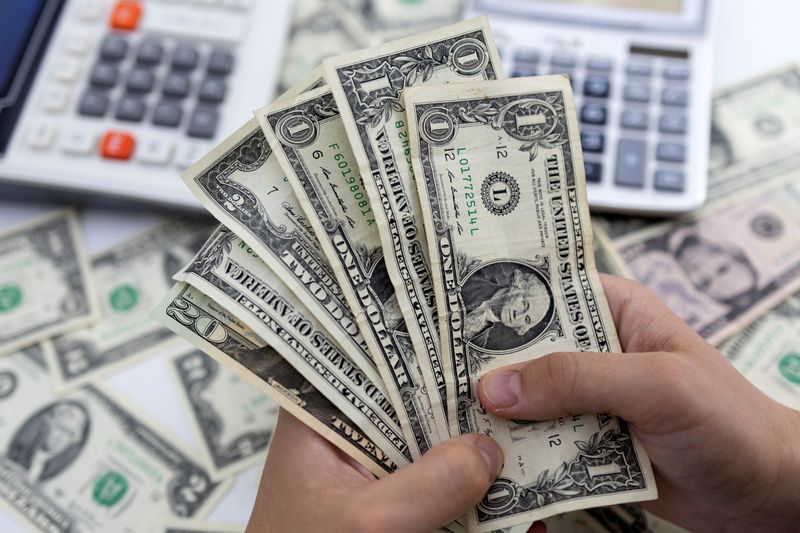
By Ankur Banerjee
SINGAPORE (Reuters) - The dollar hung around five-week lows on Tuesday as comments from Federal Reserve Chair Jerome Powell bolstered the case for a rate cut in September, while cryptocurrenices gained on rising odds of former President Donald Trump getting reelected.
Powell said on Monday the three U.S. inflation readings over the second quarter of this year "add somewhat to confidence" that the pace of price increases is returning to the Fed's target in a sustainable fashion.
"We've had three better readings, and if you average them, that's a pretty good place," Powell said at an event at the Economic Club of Washington.
The comments, likely Powell's last until his press conference following the Fed's July 30-31 meeting, shifted rate cut expectations. Markets are now anticipating 68 basis points of easing this year, with a rate cut in September fully priced in, CME FedWatch tool showed.
The euro was a shade lower at $1.0893, while sterling last fetched $1.2967. The dollar index, which measures the U.S. unit versus six peers, was at 104.3, not far from the one month low of 104 it touched on Monday.
"Despite dovish inclinations, Powell remained in a data-dependent mode which is warranted after the Fed has burnt its fingers with inflation running back higher in Q1 after a dovish pivot at the end of 2023," said Charu Chanana, head of currency strategy at Saxo.
"Markets may need to wait longer for the confirmation of their September rate cut hopes, and growth and labour data will be on the radar such as retail sales today."
U.S. retail sales for June due later in the day are expected to show a decline of 0.3% on a month on month basis.
Meanwhile, the yen was weaker in early trading after touching a one-month high against the dollar at 157.165 per dollar on Monday. It was last at 158.54, with traders wary of further intervention from the Japanese authorities.
Traders suspect Tokyo intervened in the market in another effort to lift the Japanese currency last week after the cooler-than-expected U.S. inflation report. Data from Bank of Japan indicates that authorities may have spent up to 3.57 trillion yen to prop up the frail yen.
Markets will be eyeing fresh money markets data to gauge if Tokyo intervened on Friday as well.
In cryptocurrencies, bitcoin rose 1% to trade just shy of the $65,000 mark, near its highest in a month. Ether was 1% higher at $3,466 at a two-week peak.
Cryptocurrencies, along with shares of companies that could benefit from a Donald Trump presidency, jumped on Monday after an assassination attempt on the Republican candidate boosted expectations he would win the November election.
Trump presented himself as a champion for cryptocurrency during a San Francisco fundraiser in June, although he has not offered specifics on his proposed crypto policy.
"While the crypto scene still has SEC Chair Gary Gensler as a consideration on the regulatory side, potentially having the leader of the free world in your corner will always sit well with crypto heads," said Chris Weston, head of research at Pepperstone.
In other currencies, the Australian dollar was 0.16% lower at $0.6749, creeping away from the six-month high it touched last week. The New Zealand dollar eased 0.17% to $0.6064, hitting a two-week low.
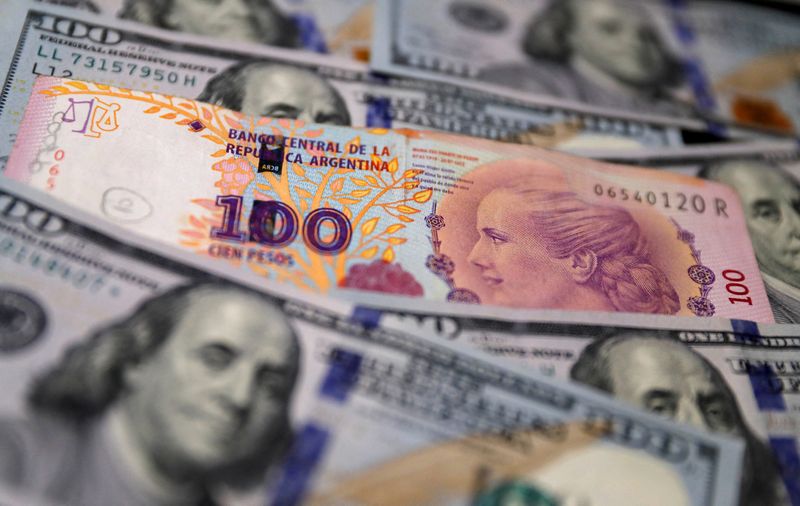
BUENOS AIRES (Reuters) - The Argentine parallel market peso appreciated against the U.S. dollar on Monday while the local stock market suffered, after new economic measures introduced by President Javier Milei's government over the weekend took effect.
Argentina's economy minister outlined on Saturday a plan to stop expanding the monetary base in an effort to combat inflation. The following day he announced a $1.5 billion purchase from the central bank to pay bond interest due in January.
The peso extended its gains to 6.01% at 1,415 pesos per dollar, after strengthening around 2% in early trading.
The gap between the black market "blue" exchange rate and the official rate narrowed slightly, and stood at 53%, after hitting some 60% last week.
"The announced measures can be taken as a positive, only if the gap falls significantly in the coming days and inflation plummets in the coming months," said local settlement and clearing agent Neix.
The benchmark Merval plummeted over 12% while over-the-counter bonds fell 3%.
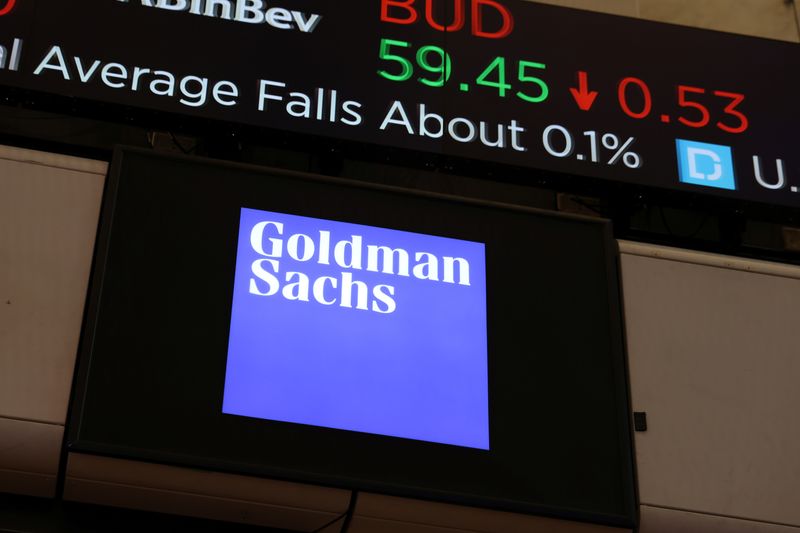
By Kane Wu
HONG KONG (Reuters) - Goldman Sachs aims to raise $2 billion in its first Asia Pacific-focused private equity fund, two people with knowledge of the bank's fundraising plan said, as it looks to deepen exposure to some of the world's fastest-growing economies.
The fund-raising effort comes as private equity firms in Asia reshape investment strategies and country allocations amid geopolitical tension, a higher interest rate environment, market volatility, and macroeconomic headwinds.
Goldman Sachs Asset Management, the bank's investment arm, has been marketing the new fund to sovereign wealth funds, pension funds and private investors, setting its sights on a first close by the fourth quarter, the sources said.
The fund, whose target size is being reported for the first time, will focus primarily on investment opportunities in Japan, with about half its capital expected to be allocated to there, one of the sources said.
India, South Korea, and Australia will also be key markets for the fund, the source said.
Both sources sought anonymity as they were not authorised to speak to the media.
A spokesperson for Goldman declined to comment.
In the first half of 2024, Asia-focused private equity fundraising was up 4% on the year at $52.7 billion, but still a far cry from the first-half average in the past decade of $131.7 billion, says industry data provider Preqin.
Global investors have been particularly cautious about deploying capital in China, deterred by its economic slowdown, regulatory crackdown and Sino-U.S. tension, which have all weighed on Asia fundraising by global private equity firms.
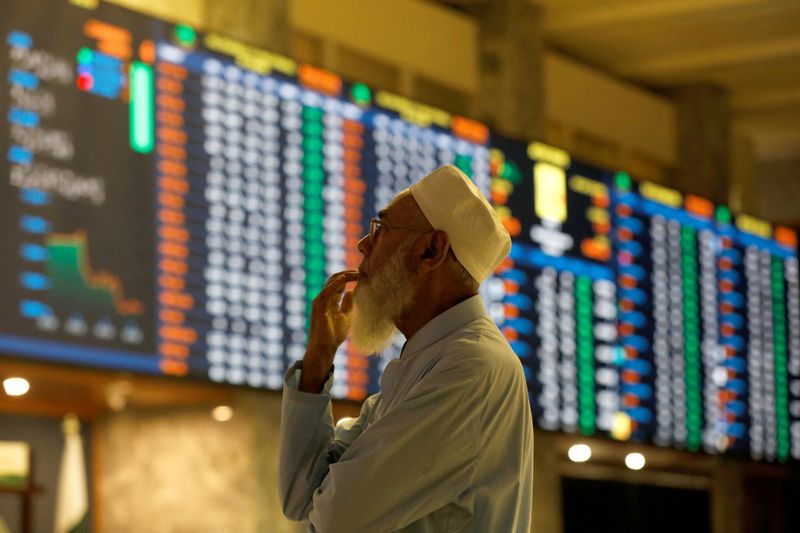
By Ariba Shahid
KARACHI (Reuters) - Pakistan's benchmark share index rose 1.44% on Monday to hit a record high after the International Monetary Fund (IMF) and Pakistan reached a staff level agreement (SLA) for a $7 billion, 37-month loan program.
The deal caps negotiations that started in May after Islamabad completed a short-term, $3 billion program that helped stabilize the economy and avert a sovereign debt default, and set challenging revenue targets in its annual budget to help it win approval from the IMF.
The benchmark share index has almost doubled since Pakistan signed its last SLA for the $3 billion standby arrangement, and is up more than 10% since Pakistan presented its annual budget.
"$7 billion was pretty much expected. I think the markets will celebrate this SLA this week, because it is a short week with two days off," said Adnan Sheikh, assistant vice president of research at Pak Kuwait Investment Company.
"The market has grown used to the IMF deal being a highly politicized, news event and the IMF asking Pakistan to do more. This time it was a silent agreement between the government and the IMF staff," said Sheikh.
He added that the market is now expecting another interest rate cut by the central bank, despite a blip in inflation because of budget measures, and expects inflows of $2-3 billion during the month.
The IMF has said that the SLA agreement is subject to approval by its Executive Board and the timely confirmation of necessary financing assurances from Pakistan’s development and bilateral partners.
This would include rollovers or disbursements on loans from Pakistan's long-time allies Saudi Arabia, the United Arab Emirates and China.
The new bailout is aimed at cementing stability and inclusive growth in the crisis-plagued South Asian country, the IMF said in a statement.
Pakistan has been plagued by crippling boom-and-bust cycles for decades, leading to 22 IMF bailouts since 1958 and is currently the IMF's fifth-largest debtor, owing $6.28 billion as of July 11, according to IMF data.

